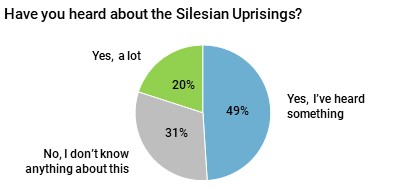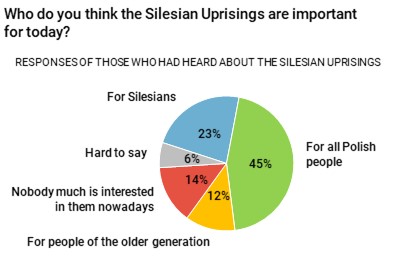14/2021
2021-04-21
Remembering the Silesian Uprisings
After a hundred years since the Silesian Uprisings, 69% of Poles have heard about them, with 20% declaring they have heard a lot, while almost every third person in the survey (31%) has heard nothing about them at all. On average, more men than women know about these uprisings (77% compared to 63%, a difference of 14 percentage points), as do better‑educated people. Among the respondents with knowledge of them, one in four (25%) has a personal connection with Upper Silesia: either they live there now or have done so in the past, have family members who used to live there or still do. Of these, 4% said they had a family member who took part.

|
Respondents who had heard about the Silesian Uprisings were also asked for whom mostly were they important today. Close to half (45%) answered that they were important for all Polish people, almost one in four (23%) picked out Silesians and 12% chose people of the older generation. On the other hand, 14% of those surveyed said that people nowadays were not really interested in these uprisings.

|
More on this subject in the CBOS report.
This ‘Current Events and Problems’ survey (370) was conducted using a mixed-mode procedure on a representative sample of named adult residents of Poland, randomly selected from the National Identity Number (PESEL) register.
Respondents independently selected one of the following methods:
– Computer Assisted Personal Interview (CAPI);
– Computer Assisted Telephone Interview (CATI), respondents receiving researchers’ telephone numbers in an introductory letter from CBOS;
– Computer Assisted Web Interview (CAWI), where respondents filled in the online questionnaire independently, gaining access by means of a login and password provided in an introductory letter from CBOS.
– Computer Assisted Personal Interview (CAPI);
– Computer Assisted Telephone Interview (CATI), respondents receiving researchers’ telephone numbers in an introductory letter from CBOS;
– Computer Assisted Web Interview (CAWI), where respondents filled in the online questionnaire independently, gaining access by means of a login and password provided in an introductory letter from CBOS.
In all three cases the questionnaire had the same structure and comprised the same questions. The survey was carried out between 1 – 11 March 2021 inclusive on a sample of 1154 people (44.5% using the CAPI method, 41.2% CATI and 14.3% CAWI).
CBOS has been conducting statutory research using the above procedure since May 2020, stating in each case the percentage of personal, telephone and internet interviews.





